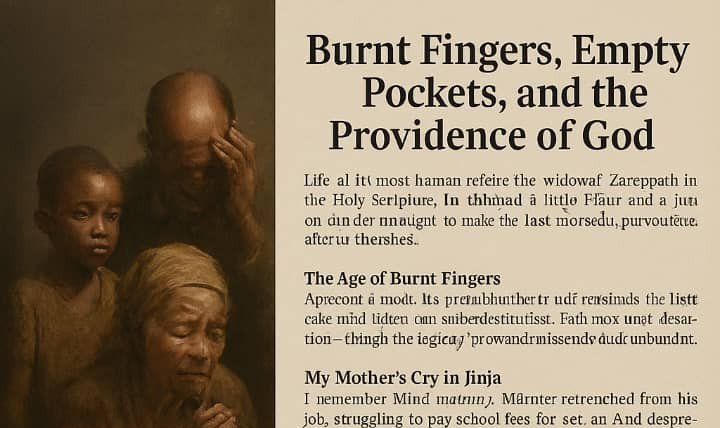By: Isaac Christopher Lubogo
Life, at its most naked, resembles the widow of Zarephath in the Holy Scripture. She had but a handful of flour and a little oil, just enough to make the last cake for herself and her son, and then resign to die. Yet, at the prophet’s word—though it sounded illogical, even cruel—she dared to believe. In giving away her last morsel, she did not perish. Her obedience to faith opened the floodgates of providence, and her scarcity was transfigured into abundance.
Is this not the parable of our lives today?
The Age of Burnt Fingers
A friend of mine, a Member of Parliament, confessed to me with a trembling voice: “Lubogo, I have burnt my fingers. I will surely die, and my wife and children may soon be destitute.” His cry echoed that haunting song: tulimubukenke ffena eno tetulina mirembe—we are in danger, we have no peace.
The banks stand over us like executioners. Loans breathe down our necks like hounds in a chase. Even our mobile phones have become traitors; the moment a faint whisper of money enters, the automated systems devour it without mercy. We are like farmers who have eaten not only the harvest but also the seed; there is nothing left to sow, no tomorrow to expect. Logic tells us we are destined to die, but faith still cries out, stubbornly, for a miracle.
My Mother’s Cry in Jinja
I remember being in Senior Three when my mother, retrenched from her job, staggered under the burden of despair. She had accepted the government’s voluntary exit package, hoping to invest wisely. But in the way of our broken economy, even well-laid plans quickly withered into dust.
School fees were due. My stepbrother Jimmy—an orphan who had never even seen the face of his biological mother—depended on her mercy. And I, her own son, needed the same. With nothing left, my mother walked through the dusty streets of Jinja town and whispered to the heavens:
“Dear God, in my lifetime I have helped the needy. Look at Jimmy, Lord—he has no mother, no father. I took him in as my own. You promised in Your Word that he who helps the poor lends to the Lord. Today, repay me, for I am desperate.”
As though heaven itself leaned down, a tap landed on her shoulder. A man’s voice broke through: “Margaret! I have been looking for you. Here is the money you lent me last time.” She had long forgotten that debt, but the exact sum matched the school fees we needed. At that moment, heaven signed its cheque on the dusty streets of Jinja.
The Modern Widow’s Jar
What, then, is the meaning of these two lives—the widow of Zarephath and my mother, Margaret? They remind us that faith does not deny the drought; it draws water out of dry wells. Faith does not erase hunger; it multiplies a crumb into a feast.
We are today’s widows, today’s retrenched workers, today’s over-borrowed fathers, today’s overburdened mothers. We live with burnt fingers, chewed-up mobile money, and debts that choke. Yet, though the logic of economics pronounces our funeral, the illogic of faith whispers resurrection.
The Theology of Burnt Fingers
There is a paradox here: we are most human when we are most desperate, for desperation strips us of pretense and places us face to face with the Almighty. When our banks mock us, when our employers dismiss us, when our children stare at us with the hunger of unanswered questions, then the heavens lean in. The God who repaid Margaret in Jinja, the God who fed the widow in Zarephath, remains the same yesterday, today, and forever.
The Call of Our Generation
We cannot deny that poverty has burnt many fingers in Uganda. Politicians are drowning in debt, professors are walking home in shame, widows are selling seed to buy bread, and mobile money agents have become the vultures of our despair. Yet we must remember this: the hand of God is never bankrupt. He who fed Israel with manna, He who returned forgotten debts to Margaret on the streets of Jinja, He who filled the widow’s jar, can still intervene.
But He demands of us one thing: faith. The courage to give when logic says keep, the daring to trust when economics says despair, the resilience to rise when society pronounces death.
Conclusion
We may have burnt our fingers, but God has not burnt His. Our logic may condemn us to die, but heaven’s arithmetic multiplies scarcity into surplus. Let us not surrender to despair. For beyond the burnt fingers lies the hand of God, and beyond our last meal lies His eternal banquet.








